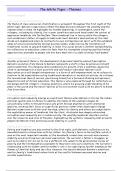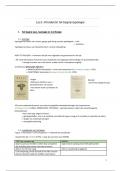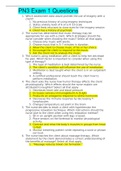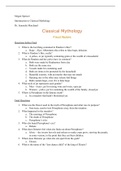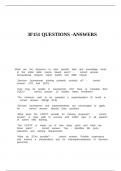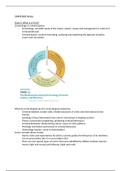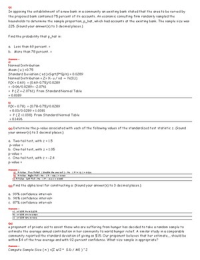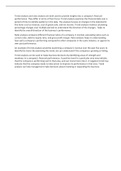2.3 Problem 6
Logical Positivists
Scientific statement can be distinguished from metaphysical statement by
being possible to verify
Popper
Recognises priority of study of logic, over subjective thought processes
Aimed to capture logical or methodological differences between scientific
differences
Popper’s falsification
Verifiability vs Falsification
Rejects verifiability criterion as it:
o Counts existential statements as scientific though no way to prove
them false
o Counts universal statements as meaningless as they can’t be
conclusively verified: these claims are common, and observations can
show them to be false
o Verifiability criterion is not meaningful as you can’t verify it
Falsifiability: scientific theories characterised by:
1. Regularly disagreeing with accepted views of the world based on common
sense, or prior theoretical commitments
2. Make testable claims that future observations may reveal to be false
Differences between Poppers falsifiability and verifiability:
Popper…
1. Says unfalsifiable claims can serve important roles even if we can’t ascertain
truth or falsity
2. Doesn’t believe empirical evidence can provide grounds for believing a theory
true or likely to be true
3. Science progressing not by confirmation of truth of previous claims, but as an
evolutionary model, with observations selecting against unfit theories by
falsifying them
Demarcation question
Demarcation problem- how to distinguish science from nonscience
Response to the verifiability criterion of demarcation from logical empiricists
Truth, justification, and belief are not the distinguishing characteristics of
knowledge
Knowledge is:
o Not justified as:
Can’t subject theories to all possible tests
An unconducted test could falsify theory
Only conduct a small number of tests: what is unknown is
greater than what is actually observed
Criticism is the best method of error elimination: we rationally
criticise our theories
Theories that survive attempts to falsify them aren’t confirmed
Subsequent tests may falsify them
o Not true
Can’t be certainly or probably true
It is verisimilitude- truth likeness
Looks like the truth, but, but not the truth in an absolute,
final sense
o Not belief (subjective)
Instead, is objective:
, 1. When knowledge claims are evaluated, they become objects
of criticism
2. Problems, theories, and arguments exist irrelevant of
whether someone believes in them
3. (Popper as an evolutionary epistemologist): can never know
things independent of our observations, we can know that
environment tolerates our perceptions, theories, and
movements as we’re surviving
False theories, perceptions, movements kill
us
Disagreed with the view at the time that pseudoscience was different from
science in that it didn’t rely on inductive, empirical methods
o Believes obvious pseudoscience often made observation/experiment
Excludes legit science and gives some pseudoscience status of scientific
Excludes possibility that there can be a refutable pseudoscience claim
Popper’s question: what characterises a genuinely empirical method from a pseudo
empirical method?
Falsification
A theory is only scientific if it rules out observable states of affairs
Test of theory is only legitimate if it attempts to falsify that theory, seeing if
states of affairs it rules out occur or not
o Recognises problem of confirmation bias
Every good theory should have statements in two subsets:
1. Observation statements, consistent with the theory
2. Set of potential falsifiers: should test to see if any of these states of affairs
occur
“What observable state of affairs are inconsistent with the theory?”
More precise the statement is, more falsifiable it is
o Existential statements aren’t falsifiable as they can’t observe all
possible space-time points
Severe testing- attempt to deduce most improbably consequences of theory
and test these
o valuable
Eg. this medicine will heal all patients- test it on the most extreme
patients that it’s the least likely to heal
Inverse relationship between theological probability of a statement and
degree of falsifiability: All mint teas are mint teas= logical probability of 1
(necessarily true), 0 degree falsifiable (don’t exclude observable states of
affairs)
Science as Problem Solving
History of science should be taught as history of problem-situations
Problems are the source of all scientific inquiry, scientific theories can only be
understood in terms of problem-situations
o Good inquiry makes problems into different deeper problems
Logical Positivists
Scientific statement can be distinguished from metaphysical statement by
being possible to verify
Popper
Recognises priority of study of logic, over subjective thought processes
Aimed to capture logical or methodological differences between scientific
differences
Popper’s falsification
Verifiability vs Falsification
Rejects verifiability criterion as it:
o Counts existential statements as scientific though no way to prove
them false
o Counts universal statements as meaningless as they can’t be
conclusively verified: these claims are common, and observations can
show them to be false
o Verifiability criterion is not meaningful as you can’t verify it
Falsifiability: scientific theories characterised by:
1. Regularly disagreeing with accepted views of the world based on common
sense, or prior theoretical commitments
2. Make testable claims that future observations may reveal to be false
Differences between Poppers falsifiability and verifiability:
Popper…
1. Says unfalsifiable claims can serve important roles even if we can’t ascertain
truth or falsity
2. Doesn’t believe empirical evidence can provide grounds for believing a theory
true or likely to be true
3. Science progressing not by confirmation of truth of previous claims, but as an
evolutionary model, with observations selecting against unfit theories by
falsifying them
Demarcation question
Demarcation problem- how to distinguish science from nonscience
Response to the verifiability criterion of demarcation from logical empiricists
Truth, justification, and belief are not the distinguishing characteristics of
knowledge
Knowledge is:
o Not justified as:
Can’t subject theories to all possible tests
An unconducted test could falsify theory
Only conduct a small number of tests: what is unknown is
greater than what is actually observed
Criticism is the best method of error elimination: we rationally
criticise our theories
Theories that survive attempts to falsify them aren’t confirmed
Subsequent tests may falsify them
o Not true
Can’t be certainly or probably true
It is verisimilitude- truth likeness
Looks like the truth, but, but not the truth in an absolute,
final sense
o Not belief (subjective)
Instead, is objective:
, 1. When knowledge claims are evaluated, they become objects
of criticism
2. Problems, theories, and arguments exist irrelevant of
whether someone believes in them
3. (Popper as an evolutionary epistemologist): can never know
things independent of our observations, we can know that
environment tolerates our perceptions, theories, and
movements as we’re surviving
False theories, perceptions, movements kill
us
Disagreed with the view at the time that pseudoscience was different from
science in that it didn’t rely on inductive, empirical methods
o Believes obvious pseudoscience often made observation/experiment
Excludes legit science and gives some pseudoscience status of scientific
Excludes possibility that there can be a refutable pseudoscience claim
Popper’s question: what characterises a genuinely empirical method from a pseudo
empirical method?
Falsification
A theory is only scientific if it rules out observable states of affairs
Test of theory is only legitimate if it attempts to falsify that theory, seeing if
states of affairs it rules out occur or not
o Recognises problem of confirmation bias
Every good theory should have statements in two subsets:
1. Observation statements, consistent with the theory
2. Set of potential falsifiers: should test to see if any of these states of affairs
occur
“What observable state of affairs are inconsistent with the theory?”
More precise the statement is, more falsifiable it is
o Existential statements aren’t falsifiable as they can’t observe all
possible space-time points
Severe testing- attempt to deduce most improbably consequences of theory
and test these
o valuable
Eg. this medicine will heal all patients- test it on the most extreme
patients that it’s the least likely to heal
Inverse relationship between theological probability of a statement and
degree of falsifiability: All mint teas are mint teas= logical probability of 1
(necessarily true), 0 degree falsifiable (don’t exclude observable states of
affairs)
Science as Problem Solving
History of science should be taught as history of problem-situations
Problems are the source of all scientific inquiry, scientific theories can only be
understood in terms of problem-situations
o Good inquiry makes problems into different deeper problems


